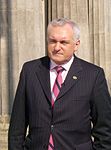Irish local elections, 2004
|
|
|||||||||||||||||||||||||||||||||||||||||||||||||||||||||||||||||||||||||||||
|---|---|---|---|---|---|---|---|---|---|---|---|---|---|---|---|---|---|---|---|---|---|---|---|---|---|---|---|---|---|---|---|---|---|---|---|---|---|---|---|---|---|---|---|---|---|---|---|---|---|---|---|---|---|---|---|---|---|---|---|---|---|---|---|---|---|---|---|---|---|---|---|---|---|---|---|---|---|
|
|||||||||||||||||||||||||||||||||||||||||||||||||||||||||||||||||||||||||||||
|
1,627 County, City, Borough and Town Council Seats |
|||||||||||||||||||||||||||||||||||||||||||||||||||||||||||||||||||||||||||||
|
|||||||||||||||||||||||||||||||||||||||||||||||||||||||||||||||||||||||||||||
The 2004 Irish local elections were held in all the counties, cities and towns of Ireland on 11 June 2004, on the same day as the European elections and referendum on the twenty-seventh amendment of the constitution. Polling was delayed until 19 June 2004 in County Roscommon, due to the sudden death of Councillor Gerry Donnelly.
Turnout was the highest for 20 years at around 60%, but the result was a major setback for Fianna Fáil, which saw its share of the vote drop by 7 percentage points from its 1999 result to only 32%, losing 20% of its council seats. The party lost its majority on Clare County Council for the first time in 70 years, and fell behind Fine Gael in Galway, Limerick and Waterford city councils. Labour's share of the vote remained static at 11% while Fine Gael dropped 1%. Both parties however won seats with the Labour Party becoming the largest party on Dublin City Council. Major gains were made by Sinn Féin which managed to double the number of seats it held, mainly at the expense of Fianna Fáil.
These were the first elections since the Local Government Act 2001 modernised council structures and abolished the dual mandate. Many new councillors were elected for the first time, most notably on Dublin City Council, where 33 of the 52 members were first-timers, which the City Manager described as "unprecedented in the history of local government". Many of the seats vacated by TDs and senators were won by family members.
...
Wikipedia






